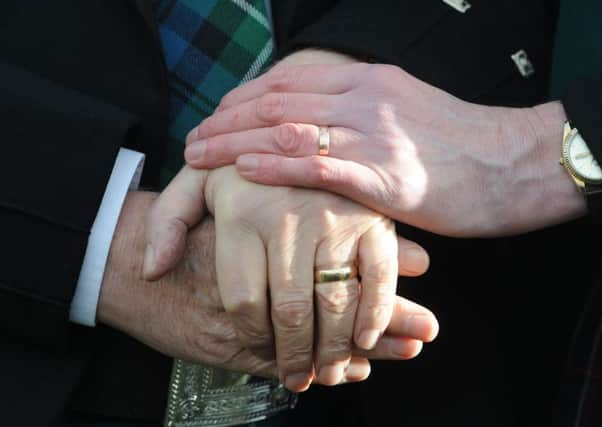Caroline Gillespie: Changes in society are reflected in family law


They say your wedding is supposed to be the happiest day of your life. But once the guests have left, the confetti swept away and the photographs glued into the album, the really hard work of building a marriage begins.
Sadly, building a lasting marriage is often too hard. According to Office for National Statistics (ONS), 42 per cent of marriages are now expected to end in divorce, with most separations taking place between a couple’s fourth and eighth wedding anniversary.
Advertisement
Hide AdAdvertisement
Hide AdFamily law was once about hatches, matches and dispatches – helping couples and their offspring to cope with births, marriages and deaths by advising on efficient inheritance and financial trusts. Its slightly darker side dealt with divorce and custody.
Times have changed. One of the major pieces of legislation reshaping family law north of the Border has been the Children (Scotland) Act 1995.
The Act, which came into effect on 1 April, 1997, was the first major piece of legislation governing the welfare of children in Scotland since 1968. It followed on from the UK’s ratification of the United Nations’ Convention on the Rights of the Child and covered a whole host of provisions from what parental rights and responsibilities actually meant through to when local authorities could intervene if a child’s welfare was under threat.
Family law has continued to evolve and develop. One of the key changes came with the Marriage & Civil Partnership (Scotland) Act 2014. Civil partnerships had been available to same-sex couples since 2004, but campaigners were concerned such unions did not receive the same recognition as marriage. The 2014 Act removed this barrier, allowing same-sex couples to marry.
A recent UK Supreme Court case highlighted how much family law has changed over the past 20 years. A British woman of Pakistani ethnicity (the respondent) had a baby girl, B, with her partner, a British woman of Indian ethnicity (the appellant). The relationship broke down and the respondent took B with her to Pakistan.
The appellant didn’t know B had been taken to Pakistan and so applied for shared residency or contact with B. When she discovered B was in Pakistan, the appellant applied for B to be made a ward of court and returned to the UK. After her application and appeal were rejected, the Supreme Court allowed the appellant’s appeal.
Such a complex case involving two women and their child would have seemed a world away when lawyers were drafting the Children (Scotland) Act.
Whether couples are married, in civil partnerships or cohabitating, they have created a legal relationship that brings with it rights and responsibilities.
Advertisement
Hide AdAdvertisement
Hide AdWhen a marriage has run its course, divorce does not have to involve heated court battles. Another way in which family law has changed is the emphasis placed on alternative dispute resolution techniques, such as arbitration, mediation and collaborative law.
For many separating couples, talking about interests over a conference table is becoming far preferable to facing each other across a courtroom.
Chancellor George Osborne’s changes allowing people to dip into their pension pots before retirement provided funding options and will raise questions about how much each partner has contributed, especially if they have chosen to use some of that cash (accumulated prior to marriage) to improve their home or enjoy a luxury holiday during the marriage.
The introduction of auto-enrolment of workers into workplace pension schemes will further fuel discussions about the entitlement of spouses to pension pots.
Nearly 20 years on from the implementation of the Children (Scotland) Act, and 30 years from the Family Law (Scotland) Act 1985, family law is continuing to evolve. It will be interesting to see what the next 20 years may bring.
• Caroline Gillespie is a partner with BLM